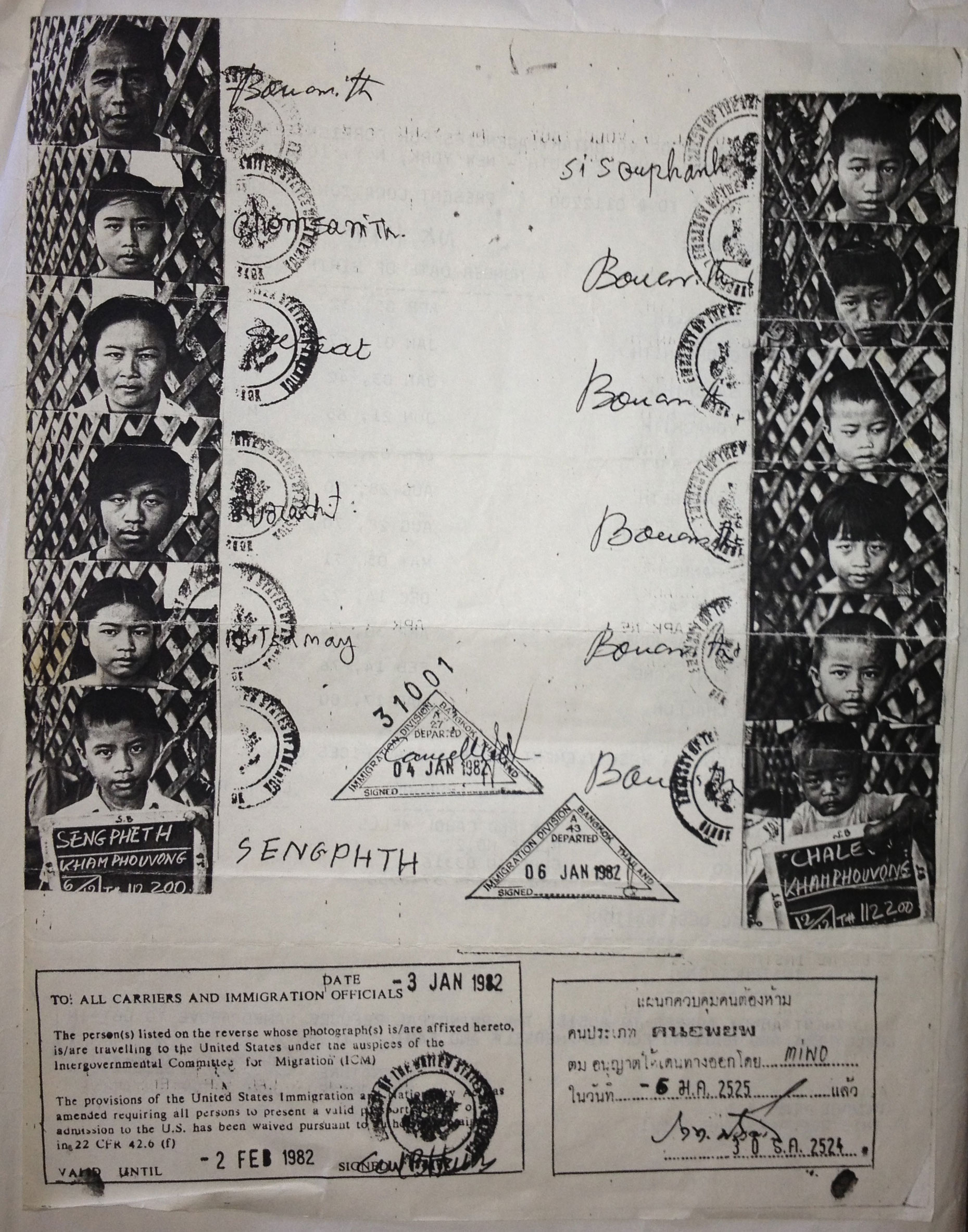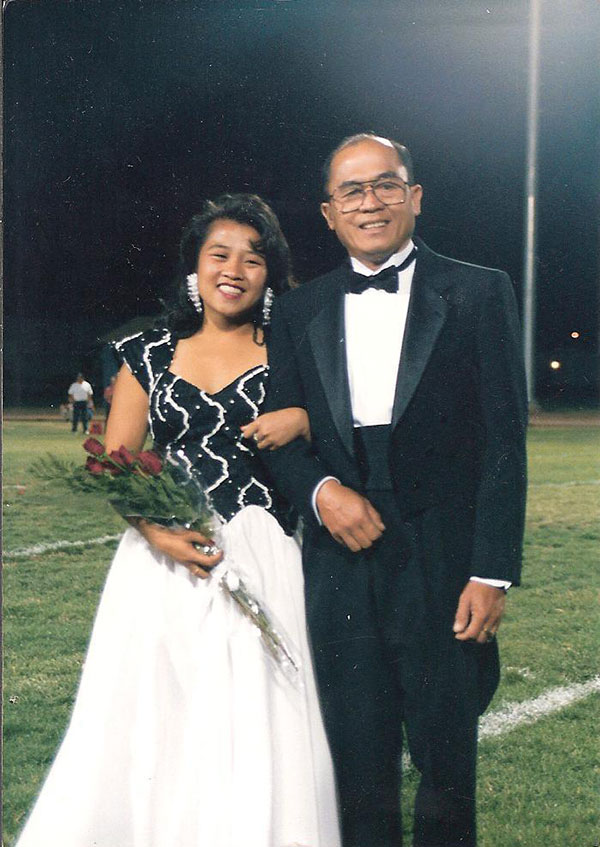
Caught in between two religions, Chiraphone begins to recognize God’s calling in her life.
Hearing the word "Pra Yesu" to me at the age of 5 was not foreign. From my Buddhist background, it was cultural to respect and revere others and other faith beliefs without disowning your own belief. At the age of 5, the songs and teachings presented by the Christian workers were fun and a positive attraction in the refugee camp, but I didn't see it in a serious light. It was just an introduction to the new, foreign faith of Christianity and the activities helped distract us from the life we left behind. I thought the Christian workers were very kind, and their care and interactions with us made the Christian faith enticing to me. They had a strong commitment to those who felt hopeless, and that made me more curious about the foreign God of Jesus. The workers were obviously not in their familiar culture or language; it was evident that their sacrifice was a reflection of their obedience to something beyond themselves.
The Wells family was and still is exceptional. They kept their promise to my father and family, and their loyalty was admirable. Each of the Wells family members made room to welcome us. Jon and Carol made room in their hearts and home for us as a family of 12. The two young boys, Todd and Roger made room for 10 more siblings! Grandma Emma and Grandpa Frank made room for us as their new family members. They assisted us as foreigners in every need. They met our physical needs by providing blankets, coats, clothing and food, especially since we were adjusting to the snow during the winter months of Idaho. There were also facilitators from the local church and small farming community who served as "welcomers" to the new 12 strangers. The kindness and God-fearing hearts of the Wells family influenced my life more than I could have ever imagined at such a young age. Their unconditional love to our family and astounding sacrifice was crucial to my faith journey.

My family proclaimed Christ as Lord and Savior back in Nongkai Refugee Camp in the early '80s because of a sense of belonging and what was offered to them during the refugee years. However, once they settled in the U.S., they did not continue actively pursuing the heart of God as Christians. Since my father was a "Maha" Buddhist monk, we lived a life of two faiths. We went as a family to Sunday church services because of the influence, and out of respect, of our sponsor family. But we also attended Saturday Buddhist ceremonies at homes or in the temples. Jesus to me was another religion, and some of the Christian practices were strange. The worship songs were very different from traditional Buddhist chants that were led by the monks.
As a young child, I was attracted to Buddhism because of its sense of connectedness and balance of harmony of beings and creation. But I was also attracted to Christianity because of the fellowship of the believers, especially their prayers and the kindness they consistently showed in giving without expectation of return.
The Castleford Baptist Church and the Wells Family gave us their best to meet our needs, despite knowing that we as new immigrants and refugees could not give back. It was my first experience of a humanitarian grace — strangers being kind to strangers — which has greatly influenced my vocational and professional career path today. I knew, from an inner awareness of the grace that was constantly being extended to me, that I was a new person with different values. But because my family was practicing elements of both faiths at the time, I struggled with feelings of dishonoring my parents, especially my mom.
At the age of 15, I was prophesied over by a guest speaker at a Christian summer camp after my family had moved to California. When I shared my name, "Chiraphone", the speaker then asked if he could share a dream he had with my name. In his dream,"Chiraphone" was written on a blackboard. Along with it were names of different countries, different tribes, and languages. He foretold that God's life purpose and calling for my life was "to meet the physical and spiritual needs of the people in this world." It was a message just for me, and it resonated in my heart. I heard "Pra Yesu" with my ears when I was 5. At the age of 15 in 1989, I heard the name "Pra Yesu" with my heart. It was a supernatural, non-negotiable moment in my life that to this day, has not wavered from the speaker's dream. It was nothing like I had ever experienced before.
Within the Buddhist tradition, there is a ceremonial gathering called "su kwan" roughly translated as "calling of the soul" for life events including weddings, funerals, and overcoming illnesses. It is a time of prayer blessings that involves sacrifices of food, lighting of candles, and is a common practice within the Theravada Buddhist tradition. Once I fully surrendered my life to the Lord Jesus Christ at the age of 15, I no longer felt at peace with participating in the "su kwan" ritual. It created a divisive strain between me and my family, especially with my Mom. She didn't take it well, because she thought this meant that I would deny all things Lao. She was afraid to lose her daughter to a foreign God and was unwilling to accept my new faith. She even wondered if I would still eat our national "kaho-neow", also known as sticky rice. She wasn't alone — community members also asked, "Why is the youngest daughter of the family not participating in the su kwan ceremony?"
My father, on the other hand, was accepting of my new conversion and I believe that the Holy Spirit was already working in his life at that time. I also received support from my siblings. Each of us as were adjusting and adapting to our own new life experiences of coming to America 13 years later as refugees. We as siblings respected and cared for each other and my new committed faith of Christ became known as my personal choice. Praise God, there was no persecution from my siblings.
Upon my return from the Christian summer camp, I saw a TV commercial advertising "The toughest job you'll ever love" — it was about serving in the Peace Corps. At the age of 15 — fresh from the prophetic word and inspired by the commercial — I knew my life was set apart and I wanted to be of service to others. But in order to join the Peace Corps, a federal agency, I needed to become a naturalized citizen. I also needed to be worthy of export, useful for international development service abroad, by earning an undergraduate college degree.
Life in America as a refugee and as an immigrant was about adjustments. My family was used to a life of affluence and influence back in Lao, and starting over in the U.S. without the full knowledge of language and cultural was difficult. Our family held strong as a unit, mostly due to my parents' vision and sacrifice of keeping us together and not allowing us to forget who we are, where we came from, how we were to be a strong family, and what it meant to work together in a new and foreign land. My parents were our rocks during the growing up years. We may not have had the latest toys or clothing, but we never lacked food. Granted, we all played a part of providing, by fishing in the Sacramento River and gardening to supplement our food. After all, we had 12 people to feed for every meal!

During my high school and college years, God was very gracious in providing various opportunities for me to become more self-aware. I also had many teachers, mentors, and kindhearted people who invested into my life. At Pleasant Valley Senior High School of Chico, CA, I had countless opportunities to serve in various leadership roles and partook in extra-curricular activities like student government, sports, and social and service clubs. I attended Azusa Pacific University to obtain my bachelor degree of global studies with minors in leadership development and culture and religion. During my undergrad years, I solely focused on leadership service and development.
Although I made many mistakes during those defining years, they refined me with a better sense of healthy boundaries and life calling as a vocation. As an Asian daughter, I always felt the pressure to perform and be well-behaved — this pressure may also have increased because my father continued his leadership status of being the president of the Northern California Lao Community in Chico, forcing our family went right into the limelight. I became very adamant with my development, focusing primarily on the call of service unto others within the context of local, national, and international needs. Everything I did aligned with the mission and goal of serving overseas. God opened my heart and mind toward a global vision and mission for the greater good during those formative years. Micah 6:8's call "to do justly, to love mercy, and to walk humbly with thy God" became a part of my life mantra. It was more evident that my life became more defined with "when much has been given, much is required" as God continued to unravel His story in my life. Indeed, in my early 20s, I knew my life was a favored life and I realized I wanted to live a life for God by serving others.
Editor’s Note:
In Part One of Chiraphone's story, we mistakenly used the term "Laotian", a French directive term for the Lao People's Democratic Republic during colonization. We have since removed all references using this term for subsequent parts of this story and in the online version.

Chiraphone Khamphouvong has served as the director of partnerships and resource development with World Relief in Cambodia since 2014. As a Lao civil war escapist, a refugee in Thailand, and an immigrant to the U.S. in 1982, she is devoted to a life of holistic international service to meet the physical and spiritual needs of the human family worldwide.